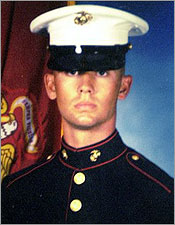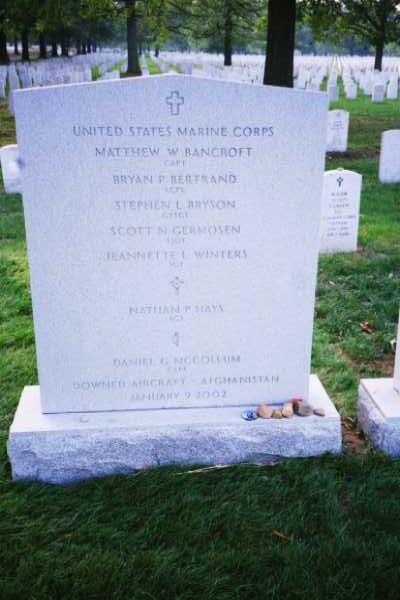U.S. Department of Defense
Office of the Assistant Secretary of Defense (Public Affairs)
News Release
IMMEDIATE RELEASE No. 014-02
January 09, 2002
DOD IDENTIFIES SEVEN MARINES KILLED IN KC-130/R CRASH
The Department of Defense announced that the following Marines were killed as a result of the crash of a KC-130/R aircraft in Pakistan today:
Command Pilot: Captain Matthew W. Bancroft, 29, of Shasta, California. He joined the Marine Corps in 1994.
Co-Pilot: Captain Daniel G. McCollum, 29, of Richland, South Carolina He joined the Marine Corps in 1993.
Flight Engineer: Gunnery Sergeant Stephen L. Bryson, 35, of Montgomery, Alabama. He joined the Marine Corps in 1983.
Loadmaster: Staff Sergeant Scott N. Germosen, 37, of Queens, New York. He joined the Marine Corps in 1982.
Flight Mechanic: Sergeant Nathan P. Hays, 21, of Lincoln, Washington. He joined the Marine Corps in 1999.
Flight Navigator: Lance Corporal Bryan P. Bertrand, 23, of Coos Bay, Oregon. He joined the Marine Corps in 1998.
Radio Operator: Sergeant Jeannette L. Winters, 25, of Du Page, Illinois. She joined the Marine Corps in 1997.
The Marines are assigned to Marine Aerial Refueler Transport Squadron 352 (VMGR-352), the “Raiders.” Elements of VMGR-352 are attached to Combined Task Force 58, in support of Operation Enduring Freedom. VMGR-352 is home-based at the Marine Corps Air Station, Miramar, California.
The cause of the crash is under investigation.
January 10, 2002
SPOKANE, Washington — Flags were at half-staff at the tiny school in Wilbur on Thursday as residents remembered 21-year-old Marine Sergeant Nathan P. Hays, who died in a military plane crash in Pakistan.
Hays played offense and defense on the football team, and went back to the town of about 1,000 people after graduation in 1999 to talk with students about the Marine Corps.
“The camaraderie and small teamwork concept of the Marines appealed to him,” recalled Bill Grigsby, who taught Hays at Wilbur High School and coached him for four years on the football team.
Grigsby said Hays loved the Marines.
“I talked to him before he went overseas. It was his job. He was excited about it. I think he understood what was involved,” he said.
Hays’ parents, James and Kim Hays, moved about a year ago to the Spokane area, 50 miles east of Wilbur.
James Hays is a Washington State Patrol trooper, and has not made a public statement on the death, said State Patrol Captain Mike Dubee of Spokane.
The family also has a 23-year old son and a 19-year-old daughter, Dubee said.
All the approximately 250 children in the Wilbur school district attend school in the same building, and many of the students knew Hays, Grigsby said.
“There’s nothing planned at the school right now,” Grigsby said. “We’re just trying to get through the day.”
Hays was an Eagle Scout and a classic car buff. He played linebacker and tight end for the football team, and was a hard worker in the weight room, Grigsby said. He was a team captain and won all-league honors.
“It was more important that we did well as a unit than he did well as an individual,” Grigsby recalled.
Chris Rettkowski, a friend and former classmate of Hays, and seven other friends of the dead Marine gathered in a small apartment Wednesday night in Spokane.
“With a guy like him, being such a strong guy and determined, he seems invincible,” Rettkowski told The Spokesman-Review of Spokane. “If you ever met a guy who wasn’t afraid of anything, it was this guy.”
Hays decided during his senior year to pursue a military career, friends said.
“He didn’t feel he was ready for college,” Alyssa Erickson, one of 33 people in Hays’ graduating class, told the newspaper.
Wilbur High Principal Tom Johnson, who taught science and had Hays as a student, told the newspaper he returned to the dryland wheat farming town a couple of times and appeared in uniform for speeches to students at the school.
“It was an honor to have known him as a student and as a Marine serving our country,” Johnson said.
Publication date: 20 June 2002
SAN DIEGO — Human error likely caused the January crash of a refueling plane over Pakistan in which seven San Diego-based Marines were killed, according to a report released Wednesday.
The January 9, 2002, accident was the deadliest crash involving American forces during the U.S.-led effort to eradicate Osama bin Laden’s terrorist network.
Investigators found that the KC-130 flight crew likely became disoriented while attempting a night landing in difficult conditions at an airfield in southwestern Pakistan, where the plane slammed into a mountainside, a review by the Marine Corps concluded.
“The most likely cause of this mishap was that the aircrew … flew too far away from the field at too low an altitude,” according to a summary of the review.
The KC-130 was approaching Bardari airfield near the village of Shamsi about 8 p.m. local time when it was redirected to take a different approach because the military wanted to reduce jet noise over the town and helicopters were parked too close to the landing strip.
Witnesses said they saw the plane circle twice in attempting to land before it crashed and exploded at an altitude of 3,800 feet. If they had gained another 200 feet, they would have cleared the mountain, officials said.
Aircraft at Shamsi must maintain an altitude of 7,000 feet for maneuvering and 5,600 feet to commence a landing attempt.
Colonel Randolph Alles, commanding officer of the Marine unit that includes the KC-130 squadron, said it’s possible the crew was flying at the lower altitude because they were attempting a visual landing, but authorities aren’t sure.
The crew had no night-vision equipment.
“They thought they were clear of the terrain,” Alles said. “There was obviously a mistake in a high-demand environment.”
Weather conditions were good that night but there was no moonlight and the crew had only the lights along the airstrip to guide them, according to investigators.
“It was not LAX,” investigator Colonel William Durrett said, comparing the remote airstrip to Los Angeles International Airport.
Four people on the flight deck — the pilot, co-pilot, navigator and flight engineer — had “collective responsibility” for maintaining a safe altitude, Alles said.
Pakistan had agreed in October to allow U.S. forces to use the base, located 50 miles from the Afghanistan border, as a forward staging area.
Since the crash, the Marine Corps has begun retrofitting three KC-130s with night-vision landing equipment and has plans to do the same to 10 more. The report also recommended upgrading the navigation system on the aircraft.
While the modifications would have helped the crew, “neither would have necessarily prevented the mishap,” the report concluded.
The squadron’s commanding officer, Lieutenant Colonel Carl Parker, said the finding of human error was “a bitter pill” for members of the squadron and families of the victims.
He said it was “safe to say” there was disbelief and anger among some family members.
Investigators acknowledged that the crew was experienced and well-trained, but operating under difficult conditions.
“All of the aircrew were at the top of their field,” said Colonel William Durrett, part of the investigation team.
The crew of seven from Marine Corps Air Station Miramar in San Diego provided supply and aerial refueling support to the war effort.
The victims included Sergeant Jeanette L. Winters, 25, of Gary, Indiana, the first female military casualty in the Afghanistan campaign.
Also killed were Captain Matthew W. Bancroft of Redding; Gunnery Sergeant Stephen L. Bryson of Montgomery, Alabama; Lance Corporal Bryan P. Bertrand of Coos Bay, Oregon; Staff Sergeant Scott Germosen of New York; Sergeant Nathan P. Hays of Wilbur, Washington; and Captain Daniel G. McCollum of Irmo, South Carolina.
Michael Robert Patterson was born in Arlington and is the son of a former officer of the US Army. So it was no wonder that sooner or later his interests drew him to American history and especially to American military history. Many of his articles can be found on renowned portals like the New York Times, Washingtonpost or Wikipedia.
Reviewed by: Michael Howard


